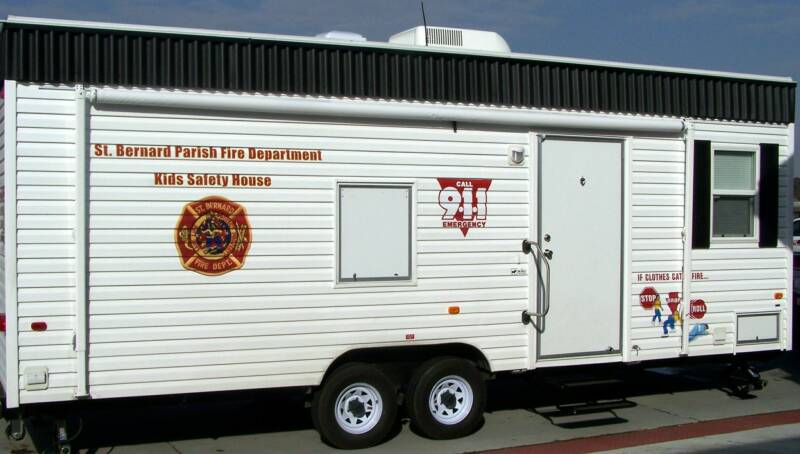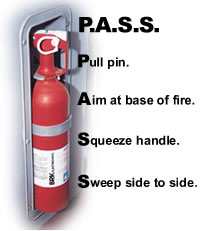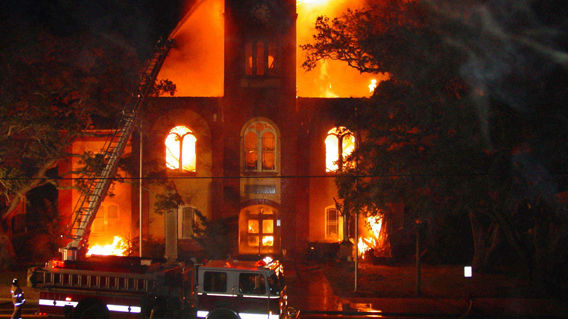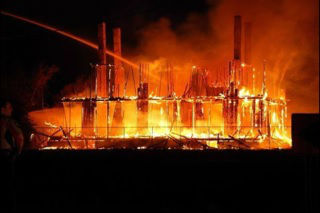Be sure to check out the Fire Safety House at a school near you!

HOME FIRE SAFETY PROGRAM:
What is a fire trap? Is it a rundown building, a crowded place of assembly with few exits, or what?
A fire trap can be defined as " any hazard that could contribute to a fire in your home."
How can you eliminate fire hazards in your home?
1. Locate the hazard. Inspect each room of your house.
2. Eliminate the hazard. If you can correct it on the spot, do so.
3. Be prepared for fire. Develop an emergency plan for your household. Everyone should know it.
Where do most fires start?
26% Kitchen
14% Bedroom
13% Living room
7% Heater/Utility rooms
40% Other areas
SAFETY CHECKS
Fireplaces:
Use spark screen or heat resistant glass doors.
Keep area in front of fireplace clear of rugs and carpet.
Use only small amounts of paper to light it.
Never use gasoline or any flammable or combustible liquids to start fire.
Never leave an open fire unattended. Do not allow children near it without proper supervision.
Be sure fire is out before going to bed. Do not close damper before fire is out or if ashes are hot.
Check the conditions of chimney, damper, bricks, etc., at least once a year.
Please use artificial logs carefully and follow manufacturer's instructions.
Space Heaters:
Use only approved type kerosene, gas fired, electric space heaters.
Be sure to check to see if your electrical wiring can handle the space heater.
When using gas fired and kerosene fueled space heaters, take the following precautions:
1. Keep all combustible materials away.
2. Keep children away.
3. Provide adequate ventilation.
4. Use the proper fuels.
5. Do not overfill, clean up any spilled fuel.
6. Never fill the heater when it is hot or when it is in use.
Electrical Appliances:
Do not overload your electrical system. All large appliances such as dryers, stoves, air conditioners, etc., should be on a
separate circuit.
Never use two heating appliances on the same circuit at the same time.
Always unplug heating appliances after each use.
Do not block air circulation around televisions, radios, and stereos.
Put away an appliance only when it is cool and never wrap an appliance cord around a warm appliance.
Never leave a hot iron unattended.
Keep your appliances clean and in good repair.
Fuses:
Always replace blown fuses with the correct size and type replacement fuse.
Never use a fuse that is too large and never substitute a copper penny for a fuse
Wiring:
Your electrical wiring has to be adequate for your demands. If you are overloading circuits and fuses,
these are some of the problem signs:
1. Blowing fuses or tripping circuit breakers.
2. Slow heating appliances.
3. Dimming lights.
4. Shrinking television picture.
If you are unsure or you suspect that you are having problems, have a licensed electrician check the problem out.
GENERAL HOUSEKEEPING SAFETY CHECKS
 INDOORS
Cooking:
INDOORS
Cooking:
Be extremely cautious around the stove and oven.
Keep curtains, towels and sleeves away from burners.
Keep cooking grease away from stove. If you have a grease fire, do not use water.
DO NOT Use WATER on a GREASE FIRE
Have a fire extinguisher available ( 10# ABC Multipurpose ) in the event of a fire in the kitchen. Know how to use it.
Keep all pot handles turned in, out of the reach of children.
Clothes Dryer:
Never use dryer to dry clothes that have flammable agents on them.
Keep dryer free from lint buildup.
Never store/place flammables on top of dryer.
Keep clothes from accumulating around the base of the dryer.
Utility Rooms:
Store cleaning materials and dust mops in ventilated fire safe areas.
Store wax, polishing clothes, oils and all flammable cleaners in tightly capped metal cans/containers.
Living Room:
Check for smoldering cigarettes under cushions and on rugs especially after parties.
Make sure all cigarette butts are cold before emptying ashtrays.
Garage:
Discard rubbish regularly and do not let it accumulate.
Keep daily household trash in covered metal cans away from heat.
Discard oily rags after use.
Keep all work areas clean.
Place all scrap material in covered metal containers, and place the containers as far away as feasible from any possible heat source ( gas water heater, welder equipment, etc. ).
Keep power tools oiled and free of dust and lint.
Poorly lubricated tools can overheat causing an electrical spark.
Never store gasoline in your garage.
Attic:
Store all family "treasures", clothes, etc... in boxes in the attic.
Keep them away from chimneys and electrical wiring.
Do not store them under or on stairways, or in hallways where they could feed a fire or block escape.
Keep all stored materials away from the central heating unit.
Never store fireworks, ammunition, etc., in the attic.
OUTDOORS
Clean up all debris, such as dried grass clippings, weeds and leaves regularly.
Do not let them collect in the yard.
Keep charcoal fires away from buildings and fences.
Never "speed up" charcoal fires with lighter fluid, kerosene oil, or gasoline.
Use any approved type starter fluid.
Do not wear loose clothing around any barbecue pit (or fires).
Be sure they are completely out before leaving them.
Never leave a barbecue pit unattended while small children are present.
Refuel equipment like lawnmowers after engine has cooled down.
Never refuel indoors.
Clean up all gasoline, grease and oil spills promptly.
Be sure cigarettes are out before discarding butts.
FLAMMABLE LIQUIDS
Gasoline, kerosene, acetone, paints, paint thinners, paint strippers, adhesives are all flammable liquids that form vapors or give off vapors which can easily catch fire or explode.
All improperly stored or handled flammable liquids are extremely hazardous.
Take these special precautions whenever you handle flammable liquids:
1. Limit your supply to a small amount. Keep flammable liquids on hand only if absolutely necessary.
2. Store them properly in air-tight metal cans and in cool, well ventilated areas. Make sure all containers are properly labeled.
3. Dispose of aerosol cans safely in metal containers with air-tight lids. Discard them as soon as possible after they are used up.
4. Clean up spills and leaks promptly.
5. Never smoke around flammable liquids. Even a tiny spark or ash may cause a fire or explosion.
Please use extreme care whenever you handle gasoline.
Never use gasoline inside the house.
So we ask you to develop Fire Safe Habits.
Avoid needless risks by being careful with the following materials:
Smoking Material:
1. Use ashtrays that are non-combustible, that are large in size, deep in depth, and heavy.
2. Dispose of ashes in the toilet - never in the waste basket.
3. Do not drop ashes on carpets or upholstery where they could smolder undiscovered.
4. Never smoke in bed!!!
Carelessness with smoking materials is the major cause of home fires.
Matches:
1. Close the cover of the matchbook every time before lighting matches.
2. Store matches properly. Keep out of the reach of small children.
3. Discard matches carefully. Make sure they are cold before you throw them away.
4. Never use matches to search in dark attics, closets, or other closed places. Use a flashlight instead.
5. Teach children to give all matches to an adult.
Never leave candles burning unattended especially if children or pets are around.
So in case of fire, Plan Ahead!! A good escape plan can save your life during a fire.
How do you plan ahead?
1. Plan your escape route(s)
Draw a floor plan of your house showing your escape routes (each room should have at least 2 exits).
Determine where your family will meet on the outside in the event of fire. Instruct all the members of your family to leave the house immediately and NEVER RE-ENTER a burning building for any reason.
2. Have Fire Drills
Practice all escape routes to ensure that they work. Examples: Make sure all windows open easily.
Keep ropes or ladders near upstairs exits. Practice using them. Perform fire drills on a regular basis.
Practice crawling low to the floor.
3. Install Smoke Detectors
Smoke and fire gases are a greater danger than flames. Be forewarned. Place at least one detector on
each floor and one in each bedroom. Install and maintain them according to manufacturers instructions.
Check them often to be sure they are in good working condition.
4. Keep a Fire Extinguisher Handy and Available
Choose an all-purpose extinguisher (10 lb ABC dry powder type). Put them near the doors of rooms with potential sources of fire (like a kitchen stove). Remember the contents empty fast so know how to use extinguishers.
Be sure they are in good working condition at all times.
Never turn your back on a fire and get out if fire gets too big or too hot.
Know the PASS System
Pull the pin.
Aim the nozzle toward the base of the fire.
Squeeze the handle.
Sweep the nozzle back and forth across the fire.

Click above for a training video
So don't get caught in a fire trap!!!!
Inspect your home for any possible fire hazards.
Correct any hazards you may find.
Plan and practice using your escape route in case of fire.
Install smoke detectors and fire extinguishers.
These safety tips are provided only as suggestions. Please try to stay safe.
Follow these links below for more ways to provide Safety for your Family:



Red Cross Fire Checklist
Page Last Updated: Oct 26, 2016 (07:13:46)
|




